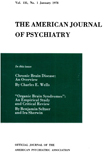DETERIORATION IN DEMENTIA PARALYTICA
Abstract
A comparative serological and psychological investigation was conducted of 52 institutionalized cases of dementia paralytica. In general, it was found that the treated cases with negative spinal fluid showed a more pronounced deficit both of intelligence and of personality resources than those cases still in an active phase. There was evidence, on the one hand, that part of the impairment to psychological functioning is reversible when the disease process is arrested early in the psychotic stage and, on the other hand, that some of the cases may continue to deteriorate even though treatment has rendered their spinal fluid negative. To explain these 2 opposite trends it would seem necessary to consider that there are at least 2 pathogenetic factors of general paresis. As judged from the test results, the psychological deficit found in dementia paralytica appears to differ from that of senile dementia.
Access content
To read the fulltext, please use one of the options below to sign in or purchase access.- Personal login
- Institutional Login
- Sign in via OpenAthens
- Register for access
-
Please login/register if you wish to pair your device and check access availability.
Not a subscriber?
PsychiatryOnline subscription options offer access to the DSM-5 library, books, journals, CME, and patient resources. This all-in-one virtual library provides psychiatrists and mental health professionals with key resources for diagnosis, treatment, research, and professional development.
Need more help? PsychiatryOnline Customer Service may be reached by emailing [email protected] or by calling 800-368-5777 (in the U.S.) or 703-907-7322 (outside the U.S.).



